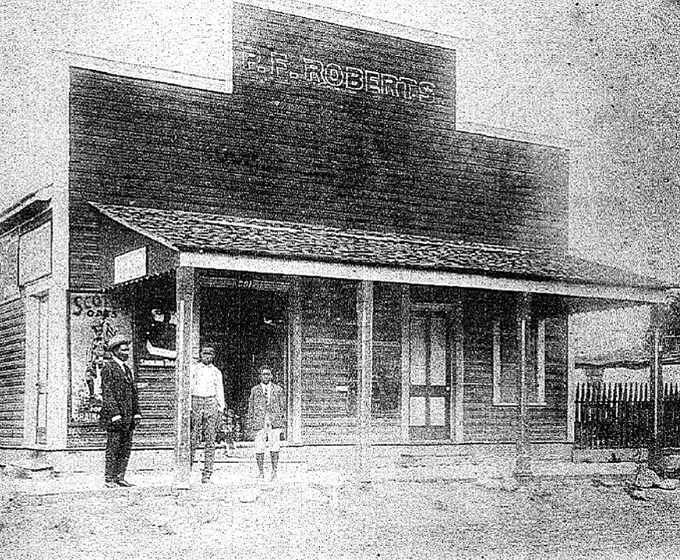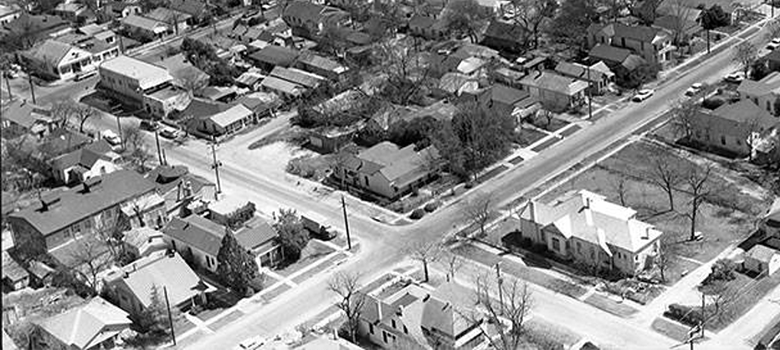
P.F. Roberts stands in front of his grocery store at 301 Victoria St.—one of few African American-owned businesses in San Antonio in the early 1900s. UTSA researchers have nominated the address for Recorded Texas Historic Landmark status.
JUNE 25, 2021 — Some of San Antonio’s richest cultural history — dating back to the city’s earliest African American community — will aim to be memorialized for future generations through efforts of researchers at UTSA.
Two local addresses, 301 Victoria St., and 601 S. Pine St., near the east side of downtown San Antonio, have been nominated by the Center for Cultural Sustainability, an office within the UTSA College of Architecture, Construction and Planning, for Recorded Texas Historic Landmark status from the Texas Historical Commission.
Both sites convey the history of local business owner and civil rights leader P.F. Roberts.
What is now the corner of Indianola Street and E. César E. Chavez Blvd., once was the address of 301 Victoria St., where the P.F. Roberts Store stood.
The grocery store was one of few African American-owned businesses in San Antonio in the early 1900s.

The neighborhood surrounding 301 Victoria St., home of the first P.F. Roberts Store, as photographed in 1965.
Although the store’s building and address no longer exists, the historical designation would honor Roberts. The second property in the historical landmark nomination is Roberts’ second store and home, which still stands at 601 S. Pine St., and is currently owned by Roberts’ grandson Ernest Qadimasil.
“Pat Frost, the president of Frost Bank, contacted UTSA leadership about Ernest, who is the grandson of P.F. Roberts,” explained William Dupont, the Conservation Society of San Antonio Endowed Professor and director of UTSA’s Center for Cultural Sustainability. “He was interested in seeing if UTSA could help with some research to achieve what Ernest wanted to do, which is recognition and respect for these two sites. So we convened a team of UTSA researchers to write the nomination, including Charles Gentry, Anthony Vannette, and Kelsey Brown. We received a lot of help form Ernest, too.”
A son of enslaved people, Roberts graduated as valedictorian from Tougaloo College in Mississippi, and soon moved to San Antonio in 1895 to teach at the Norris Wright Cuney School, located in what was then the Baptist Settlement neighborhood.
The former Baptist Settlement, a 10-square block area anchored by the Mt. Zion Baptist Church then located near the present-day intersection of Lavaca and Labor Streets just one block south of the Institute of Texan Cultures, is among the earliest African American communities in San Antonio. It was also one of the first places that enslaved people and free Black people were allowed to settle in Bexar County.
In addition to work as a teacher which paid very little, Roberts worked multiple jobs. By 1906, he was able to open the P.F. Roberts Store at the former Victoria Street, which was one of the only grocery stores in the Baptist Settlement community. The store sold meat, coal, oil, groceries, wood and other dry goods.
Not long after moving to San Antonio, Roberts befriended Thomas Claiborne “T.C” Frost, founder of Frost Bank, who is said to have loaned Roberts $2,000 in 1896, which would have helped Roberts start his mercantile and real estate endeavors, courageous pursuits in a time of laws, policies, and violence against African Americans.
“(P.F. Roberts and T.C. Frost) were friends at a time when it would have been unusual for them to be friends, even though each was a prominent leader in their communities,” Pat Frost said. “We were proud of the assistance that T.C. Frost and Frost Bank provided to Mr. Roberts in helping to establish his store, and it led us to a more thorough understanding of T.C. Frost’s role in supporting civil rights for everyone.”
He added that although the story of Roberts and T.C. Frost’s business dealings and friendship, as well as the significance of the Victoria Street and Pine Street properties to the early civil rights movement, isn’t widely known, both are very relevant in today’s social environment.
“The more knowledge there is about how business leaders worked together more than 100 years ago to further race relations and civil rights, the more that example can be applied to similar discussions today,” Frost said.
Roberts eventually opened a second store at his home, on Pine St., in the Denver Heights neighborhood. The Pine Street store operated until 1927.
During his lifetime, Roberts was an advocate for civil rights and served as a founding member of the NAACP San Antonio Chapter. It’s said Roberts hosted civil rights meetings, which included local and national leaders such as Thurgood Marshall, Reverend Claude William Black, Jr., Henry B. González, Eleanor Roosevelt, and several others, at the home on Pine Street.
“These two addresses need to be illuminated for the general public, not just for the African American community, but so people might know the activity related to civil rights, women’s rights and Hispanic rights that took place at these addresses,” Qadimasil said. “So many leaders met at the 601 S. Pine St. address to map out the civil rights strategy for the Southwest and United States as well. Little is known about that in this community.”
The nominations for historical status “concern aspects of San Antonio history that need to be understood and recognized,” Dupont added.
UTSA takes an innovative, multi-disciplinary approach to historic preservation—merging conservation with sustainability, urban and regional planning, engineering and other STEM disciplines. Programs include a Graduate Certificate in historic preservation, Master of Science in architecture with a concentration in historic preservation, and Ph.D. in building performance with a focus on historic preservation.
UTSA Today is produced by University Communications and Marketing, the official news source of The University of Texas at San Antonio. Send your feedback to news@utsa.edu. Keep up-to-date on UTSA news by visiting UTSA Today. Connect with UTSA online at Facebook, Twitter, Youtube and Instagram.
Move In To COLFA is strongly recommended for new students in COLFA. It gives you the chance to learn about the Student Success Center, campus resources and meet new friends!
Academic Classroom: Lecture Hall (MH 2.01.10,) McKinney Humanities BldgWe invite you to join us for Birds Up! Downtown, an exciting welcome back event designed to connect students with the different departments at the Downtown Campus. Students will have the opportunity to learn about some of the departments on campus, gain access to different resources, and collect some giveaways!
Bill Miller PlazaJoin us for an intimate evening of cocktails, conversation, and culinary inspiration with Pati Jinich, Emmy-nominated chef and James Beard Award-winning author. Enjoy light bites and signature drinks in the warm, modern setting of Mezquite as Pati connects with guests over her passion for Mexican cuisine and storytelling.
Mezquite Restaurant in Pullman Market, 221 Newell Ave., San Antonio 78215From inspired courses to thoughtful pairings and a rich sense of community, the Ven a Comer Signature Dinner is a night of shared meals, shared stories, and unforgettable flavor.
Stable Hall (Pear Brewery), 307 Pearl Pkwy, San Antonio 78215Come and celebrate this year's homecoming at the Downtown Campus with food, games, giveaways, music, and more. We look forward to seeing your Roadrunner Spirit!
Bill Miller PlazaThe University of Texas at San Antonio is dedicated to the advancement of knowledge through research and discovery, teaching and learning, community engagement and public service. As an institution of access and excellence, UTSA embraces multicultural traditions and serves as a center for intellectual and creative resources as well as a catalyst for socioeconomic development and the commercialization of intellectual property - for Texas, the nation and the world.
To be a premier public research university, providing access to educational excellence and preparing citizen leaders for the global environment.
We encourage an environment of dialogue and discovery, where integrity, excellence, respect, collaboration and innovation are fostered.